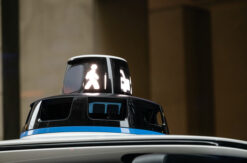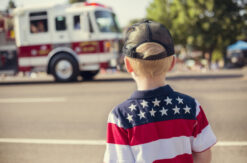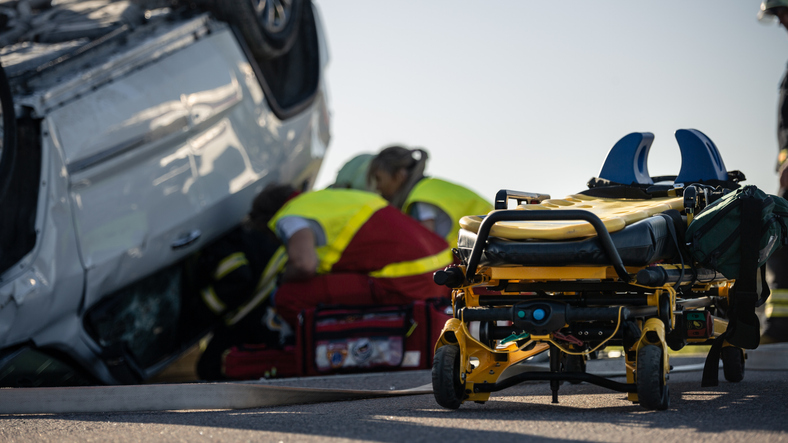
The impact of a rollover car accident can be life-altering. The sudden, violent nature of a rollover can leave survivors with post-traumatic stress disorder (PTSD), causing nightmares, flashbacks, and an overwhelming sense of dread when thinking about driving or being near cars.
If you or a loved one was involved in a rollover car accident, it’s crucial to consult with an experienced car accident attorney who can investigate your case and hold the liable parties accountable. Read on to learn more about the causes of rollover car accidents and how victims can recover compensation for their damages.
What Is a Rollover Car Accident?
A rollover car accident occurs when a vehicle flips over onto its side or roof, usually due to losing control. These kinds of accidents can involve a single vehicle or multiple vehicles and are often more severe than other types of crashes. Rollover accidents can be especially deadly if the vehicle’s occupants are thrown around inside the car or even ejected if they are not wearing seat belts.
Taller vehicles like SUVs, trucks, and vans are more prone to rolling over in a crash. Truck accidents are particularly hazardous because of the size and weight of trucks compared to smaller passenger vehicles.
Types of Rollover Accidents
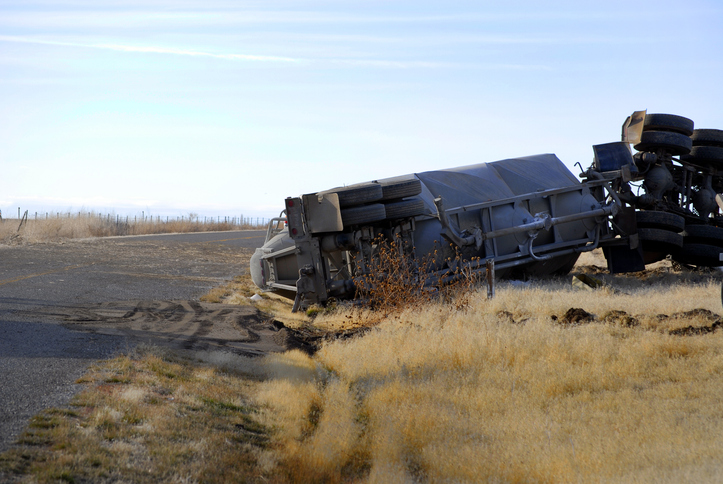
There are two main categories of rollover accidents: tripped and untripped rollovers.
Tripped Rollover Accidents
Tripped rollover accidents occur when a vehicle’s tires hit an object, causing it to tip over. The three primary types of tripped rollovers are:
Soft Soil
- This type of tripped rollover occurs when a vehicle leaves the roadway and travels onto soft soil or gravel. The tires can sink into the soft ground, creating a sudden deceleration on one side of the vehicle, which can cause it to tip and roll over. This is especially common in rural areas or construction zones with unstable road shoulders.
Guardrail
- A guardrail tripped rollover happens when a vehicle strikes a guardrail at an angle. As the vehicle’s wheels climb the guardrail, the center of gravity shifts, leading to a rollover. This rollover type can be particularly dangerous as the vehicle may roll back onto the road or into oncoming traffic.
Steep Slope
- Vehicles that travel on steep inclines or slopes are at risk of tripped rollovers if the slope is too steep for the vehicle’s stability. If a vehicle’s tires lose traction or if the vehicle is steered too sharply while on a slope, the high center of gravity can cause it to tip and roll down the incline. This is a common risk for off-road driving or on mountainous terrain.
Untripped Rollover Accidents
Untripped rollovers occur without the vehicle hitting an external object. Untripped rollovers usually result from sharp steering maneuvers, high speeds, or sudden maneuvers. These rollovers typically occur when a driver swerves to avoid an obstacle or when making a sharp turn at high speed.
Common Causes of Rollover Accidents
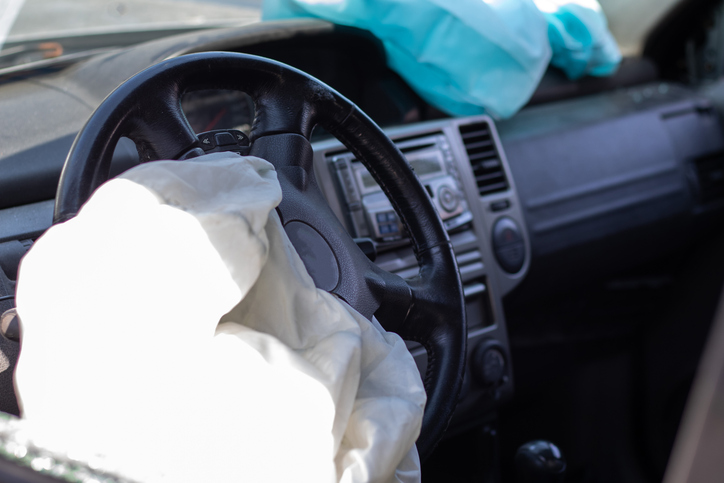
- Speeding: Speed reduces the driver’s ability to control the vehicle, and the higher the speed, the more likely it is that the vehicle will become unstable and tip over. Speeding is a factor in 29% of all traffic fatalities and kills an average of 33 people each day.
- Sharp turns: Driver behavior and errors, such as steering overcorrection, contribute significantly to rollover accidents. Sudden or sharp steering movements, especially at high speeds, can cause a vehicle to lose balance and roll over.
- Vehicle design and type: Vehicles that have a higher center of gravity, such as trucks, SUVs, and vans, are more susceptible to rolling over. The design of these vehicles makes them more susceptible to tipping during sharp turns or on uneven surfaces.
- Overloading or improperly loaded cargo: Carrying heavy or improperly distributed loads can raise a vehicle’s center of gravity, making it more prone to rollovers. Overloading also affects vehicle handling, making it more difficult to control.
- Poor road conditions: Wet, icy, or uneven roads can cause a vehicle to lose traction and stability, increasing the risk of a rollover. Hitting a pothole or curb can also lead to a tripped rollover.
- Mechanical failures: A tire blowout or mechanical issue, such as brake failure, can cause a vehicle to become unstable and lead to a potential rollover.
Why Are Rollover Crashes So Deadly?
Rollover accidents can be devastating, often resulting in catastrophic injuries or fatalities. In a rollover, occupants are at risk of being thrown around inside the vehicle, leading to traumatic brain injuries, severe head injuries, spinal cord injuries, broken bones, and other serious injuries. In many cases, occupants are ejected from the vehicle, which significantly increases the risk of death. Occupant ejection can cause serious injury and even death.
Beyond physical injuries, rollover crashes also have serious emotional and financial consequences. Victims may face long-term disabilities requiring extensive medical treatment and rehabilitation. The emotional toll can include PTSD, anxiety, depression, and a diminished quality of life. A personal injury lawyer can help rollover accident victims pursue fair compensation and hold the liable party responsible for their injuries and losses.
Rollover Accident Statistics
Rollover accidents are more likely to result in fatalities than other types of crashes. According to the National Highway Traffic Safety Administration (NHTSA), rollovers involving light trucks account for about 32,000 passenger vehicle occupant fatalities annually.
Heavy vehicles, including SUVs and trucks, are more likely to roll over than passenger cars like coupes and sedans. In 2022, single-vehicle rollover fatalities accounted for 17% of all occupant deaths in cars, 30% of occupant fatalities in pickup trucks, and 26% of occupant deaths in SUVs.
Common Injuries Sustained in Rollover Car Accidents
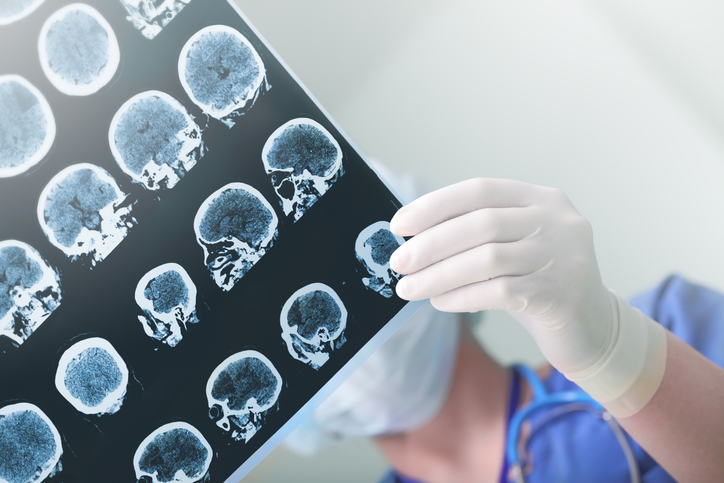
Rollover car accidents often result in severe injuries. Common rollover car accident injuries include the following:
- Traumatic brain injuries (TBIs)
- Whiplash
- Soft tissue injuries
- Spinal cord injuries and paralysis
- Broken bones and fractures
- Internal injuries
- Cuts, bruises, and lacerations
- Whiplash and neck injuries
- Wrongful death
Recovery After a Rollover Car Accident
Recovery time after a rollover car accident and healing is very personal and depends on the injury and its severity. Victims of rollover accidents often face life-threatening injuries. Emotional recovery is equally important, as victims often struggle with PTSD, anxiety, and depression. Victims often experience intense fear and anxiety during the incident, which can linger for several years. The trauma can also lead to hypervigilance and a constant fear of another accident. These emotional scars can disrupt daily life, affecting personal relationships, job performance, and overall quality of life.
Seeking psychological counseling and support groups can be crucial in helping victims recover, as well as having a strong support system of family and friends. Legal support from an experienced car accident attorney can help victims pursue compensation to cover damages, including medical bills, therapy costs, and pain and suffering.
What Compensation Is Available in a Rollover Crash Case?

Victims of rollover accidents may be able to recover the following types of compensation in a personal injury claim:
- Medical expenses: This includes the cost of medical bills, physical therapy, surgeries, and any future medical needs related to the injuries sustained in the accident.
- Lost wages: To recover lost wages, you must prove that the injuries caused you to miss work and were directly related to the incident. These damages can also include loss of future earning capacity if the injuries result in long-term or permanent disability.
- Pain and suffering: Victims can recover compensation for the physical pain, emotional trauma, and mental distress they experienced as a result of the accident.
- Property damage: These damages can cover the costs of repairing or replacing the vehicle and any other property that was damaged in the accident.
- Loss of consortium: A car accident victim can pursue compensation for the impact the injuries have on the victim’s relationship with their family or spouse, including loss of companionship or support.
- Punitive damages: In cases where the accident was caused by extremely reckless or egregious behavior, punitive damages may be awarded to punish the liable party.
Reducing the Risk of Rollover Accidents
To reduce the risk of rollover accidents, drivers can follow these safety tips:
- Obey speed limits: Always drive within the posted speed limits. It’s crucial to reduce speeds in areas with sharp curves or steep inclines to avoid a potential rollover.
- Avoid sudden maneuvers: Gradual steering and braking are key to maintaining vehicle stability. Avoid making sharp turns or sudden lane changes, especially at high speeds.
- Regular vehicle maintenance: Keep your vehicle in good condition, including checking tire pressure, alignment, and suspension. Well-maintained vehicles are less likely to experience mechanical failures that could lead to a rollover.
- Distribute cargo properly: Ensure that any cargo is evenly distributed and does not exceed the vehicle’s weight capacity. Overloading or improperly loaded cargo can raise the vehicle’s center of gravity, increasing the risk of a rollover.
- Drive cautiously on uneven surfaces: Be extra cautious when driving on gravel roads, off-road terrain, or areas with steep slopes.
- Wear seat belts: Always wear your seat belt and ensure all passengers do the same. Seat belts significantly reduce the risk of ejection during a rollover, which is crucial for survival. Buckling up can reduce a front passenger’s risk of fatal injury by 45%.
Our San Francisco Car Accident Attorneys Are Here to Help
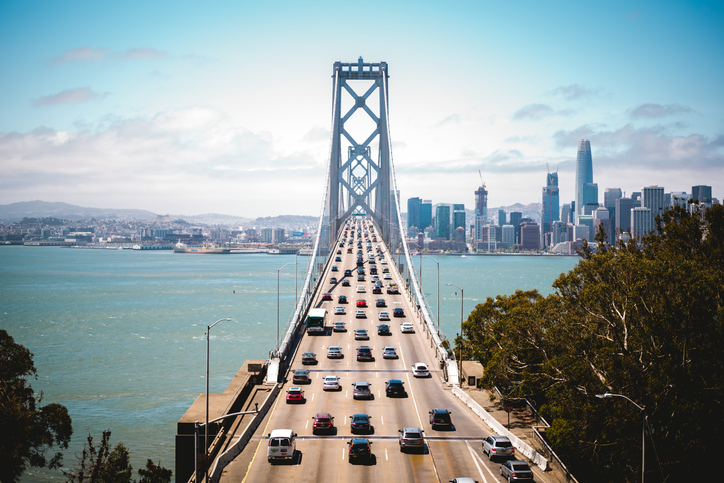
If you or a loved one has been involved in a rollover car accident, our San Francisco car accident attorneys are here to help. At Golden State Accident Lawyers, we understand the physical, emotional, and financial challenges involved in rollover accident cases.
Our dedicated team of personal injury lawyers is committed to helping victims obtain justice. We offer personalized legal services tailored to your unique situation and will work tirelessly to hold the responsible parties accountable. Call us today for a free consultation.

